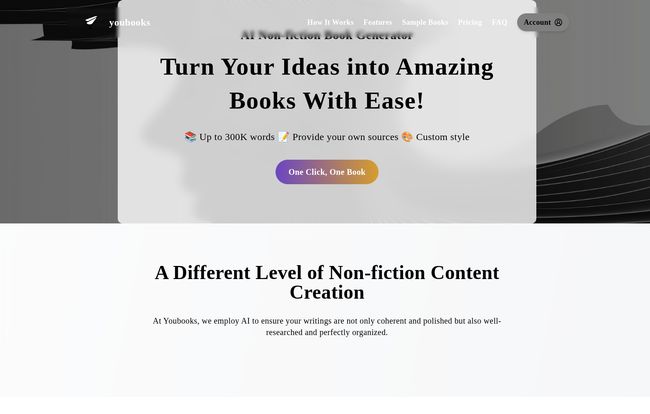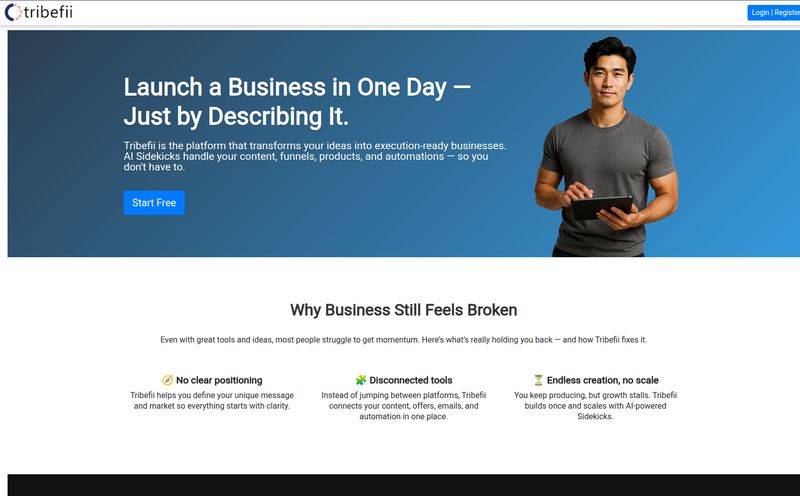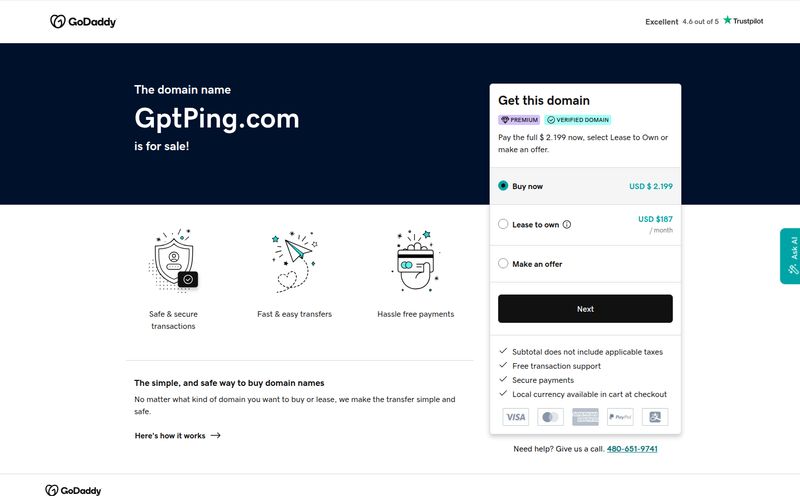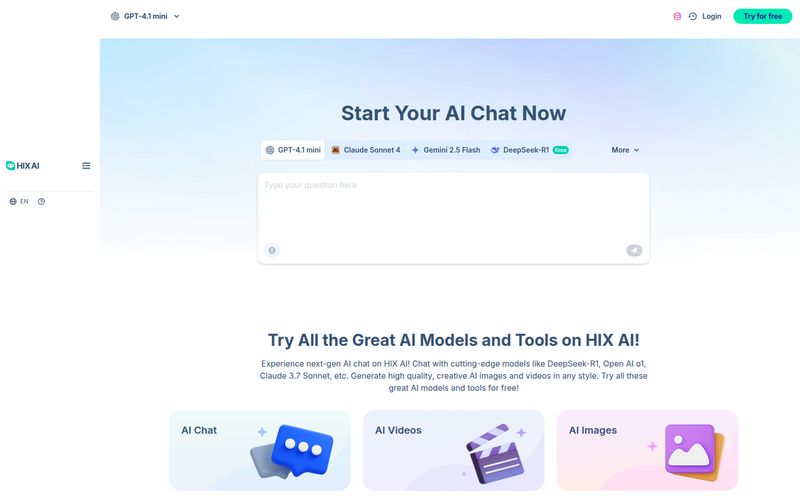As a blogger and SEO, I've seen my fair share of AI writing tools. They pop up faster than dandelions in spring, each one promising to be the next big thing. Most of them are… fine. They stitch together sentences, pull from the same overused sources, and give you a B-minus article that needs a ton of human intervention to not sound like a robot wrote it. It’s a familiar dance.
So, when I stumbled upon a platform called Youbooks, my default skepticism kicked in. Another AI book generator? Groundbreaking. But then I looked a little closer. They weren't just talking about generating text; they were talking about a “multi-agent AI system” and a “1,000-step process” to create real books. Not just long blog posts, but cohesive, well-researched, non-fiction books up to 300,000 words. My interest was piqued.
Could this be it? An AI tool that acts less like a lazy intern and more like a dedicated research assistant and first-draft powerhouse? I had to see for myself.
What is Youbooks, Really?
At its core, Youbooks is an AI-powered platform designed to take a single idea and flesh it out into a complete non-fiction book. But it claims to be different from the simple prompt-and-pray models we're used to. The secret sauce, according to their site, is a multi-agent system. Now, that sounds like a bit of marketing jargon, but what it boils down to is this: instead of one AI doing everything, they have specialized AIs working together.
Think of it like an assembly line for a book. One agent is the 'Brainstormer,' another is the 'Outliner,' a third is the 'Researcher,' and a fourth is the 'Writer.' They pass the project along, each adding their specialized touch. This is supposed to create a much more coherent and deeply researched final product than a single AI trying to juggle all those tasks at once. It’s an intriguing approach, and in my opinion, a far more logical way to handle a project as complex as a book.
From a Spark of an Idea to a Full Manuscript
The process itself seems almost deceptively simple. The platform's whole vibe is “One Click, One Book,” and they aren't kidding. You don't need to craft a 500-word super-prompt. You basically provide three things:
- The Subject: What’s the book about? Be as specific or as broad as you like.
- The Writing Style: Do you want it to sound like Malcolm Gladwell, Brené Brown, or just a straightforward academic? You can define the tone and voice.
- Your Sources (Optional): This is a big one. You can provide your own URLs, articles, or research papers for the AI to use as a foundation. This gives you a massive degree of control over the factual basis of your book. ol>
You pop in your email, hit the button, and… you wait. This isn't an instant process, which, counterintuitively, I actually see as a good thing. More on that in a bit.

Visit Youbooks
The Good, The Bad, and The AI-Written
Alright, no tool is perfect. After poking around and seeing the output, I've got some thoughts. It's not all sunshine and rainbows, but there's a lot to be genuinely excited about.
Where Youbooks Shines
First off, the potential for efficiency here is massive. For consultants, coaches, or experts who have a wealth of knowledge but no time to write, this is a godsend. You can feed it your blog posts, lecture notes, or case studies and have a lead magnet or even a full-fledged book in a matter of hours. The ability to download in multiple formats (DOCX, EPUB, etc.) is also a huge plus. As someone who's wrestled with formatting for KDP, having a clean EPUB file from the get-go is a small miracle. And the deep research component, especially when you provide sources, means the output isn't just generic fluff. It feels substantial.
A Few Caveats to Consider
Now for the reality check. The biggest drawback is the lack of fine-tuned control during the writing process itself. You set the direction and let it run. If the AI misinterprets your vision slightly, you can't jump in and course-correct. You get what you get, and then the editing is on you. Also, the generation time—anywhere from 3 to 8+ hours—might feel slow in our instant-gratification world. But again, I see this as a sign that it’s doing some heavy lifting, not just spitting out text. This isn't your quick 500-word blog post generator. This is a marathon runner, not a sprinter.
The free option is also quite limited, capping you at 10,000 words with a simplified generation process. It's a decent taste, but it won’t give you the full experience of the multi-agent system.
Let's Talk About the Price Tag
Okay, this is the part where things get a little wild. I had to double-check the pricing examples on their homepage because I thought I'd misread them.
- 50,000 words for €8.00
- 70,000 words for €9.50
- 100,000 words for €10.00
Yes, you read that right. Ten euros for a 100,000-word book. For context, hiring a human ghostwriter for a project that size would cost you thousands, if not tens of thousands, of dollars. Even other AI tools with far fewer features often run on monthly subscriptions that cost way more than this for a single book. I'm not entirely sure how this pricing model is sustainable for them, but for the user, it’s an absolute no-brainer. It makes the barrier to entry for creating a book practically non-existent. There's no subscription, no commitment—you just pay per book. It’s refreshingly straightforward.
Who is This Tool Actually For?
So who should be jumping on this? I see a few key groups:
- Subject Matter Experts: Consultants, coaches, and professionals who want to codify their knowledge into a book to build authority.
- Content Marketers: Imagine turning your company's top 10 blog posts into a comprehensive e-book for lead generation. Easy peasy.
- Historians and Researchers: People who need to synthesize large amounts of information from specific sources into a coherent narrative.
- Aspiring Authors: Anyone who has a great idea for a non-fiction book but is intimidated by the sheer scale of the writing process. This can get you a solid first draft to work from.
It's probably not for novelists or poets. The creative, deeply personal spark of fiction is still a uniquely human domain. But for structured, information-driven content, Youbooks is a serious contender.
A Human Touch on AI Output
Here’s my most important piece of advice: do not just generate a book and slap it up on Amazon. That's a recipe for mediocrity. Think of Youbooks as the world's most efficient research assistant and first-draft writer. It does the heavy lifting—the structuring, the research, the initial writing—but the final polish, the voice, the stories, and the soul? That has to come from you.
You still need to be the author. Fact-check the output. Weave in your personal anecdotes. Refine the language to truly match your voice. Platforms like Amazon's Kindle Direct Publishing are becoming increasingly savvy about AI-generated content, and they require you to disclose its use. According to KDP's content guidelines, you need to inform them of AI-generated content. But “AI-assisted” content—where you use tools to help you but are still the primary creator—is a different story. Use Youbooks to build the skeleton, but you have to be the one to give it life.
Frequently Asked Questions about Youbooks
- Can I really publish the book commercially?
- Yes. According to their FAQ, you receive a full commercial license to edit, publish, and sell the book Youbooks creates for you. You are the author.
- How good is the research?
- The quality of the research largely depends on your input. If you provide high-quality sources, the AI will use them to build a well-founded book. Without sources, it relies on its general training data, which is broad but may not be specific enough for niche topics.
- Can it write in different languages?
- Yes, one of the powerful features is the ability to translate the generated book into other languages, expanding your potential audience significantly.
- Is there a subscription?
- No, and this is a major selling point. Youbooks operates on a pay-per-book model. There are no recurring fees or hidden charges.
- What if I don't like the book it generates?
- This is the main risk. Because you can't intervene during the process, the final output is what you get. The low cost helps mitigate this risk, but it's important to be very clear with your initial subject and style prompts.
Final Thoughts: A Tool, Not a Magic Wand
After digging in, I'm genuinely impressed with what Youbooks is trying to do. It’s not just another text spinner. The multi-agent approach is smart, and the ability to incorporate your own sources is a game-changer for creating credible non-fiction content.
Is it going to write a Pulitzer-winning masterpiece for you with one click? Of course not. But it can absolutely crush the 'blank page' problem and deliver a structured, well-researched, and surprisingly coherent first draft for an absurdly low price. For busy professionals and aspiring authors, it lowers the barrier to entry from a mountain to a speed bump.
In the ever-growing sea of AI tools, Youbooks has managed to create something that feels different. It's a powerful tool, and in the right hands, it could be the catalyst that finally gets that book out of your head and into the world.
Reference and Sources
- Youbooks Official Website: (link would go here)
- Amazon Kindle Direct Publishing AI Content Guidelines: https://kdp.amazon.com/en_US/help/topic/G200672390#ai



